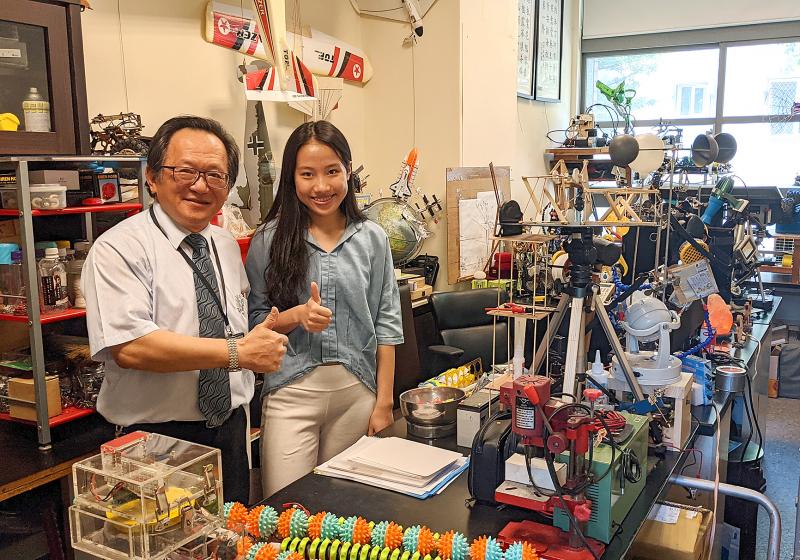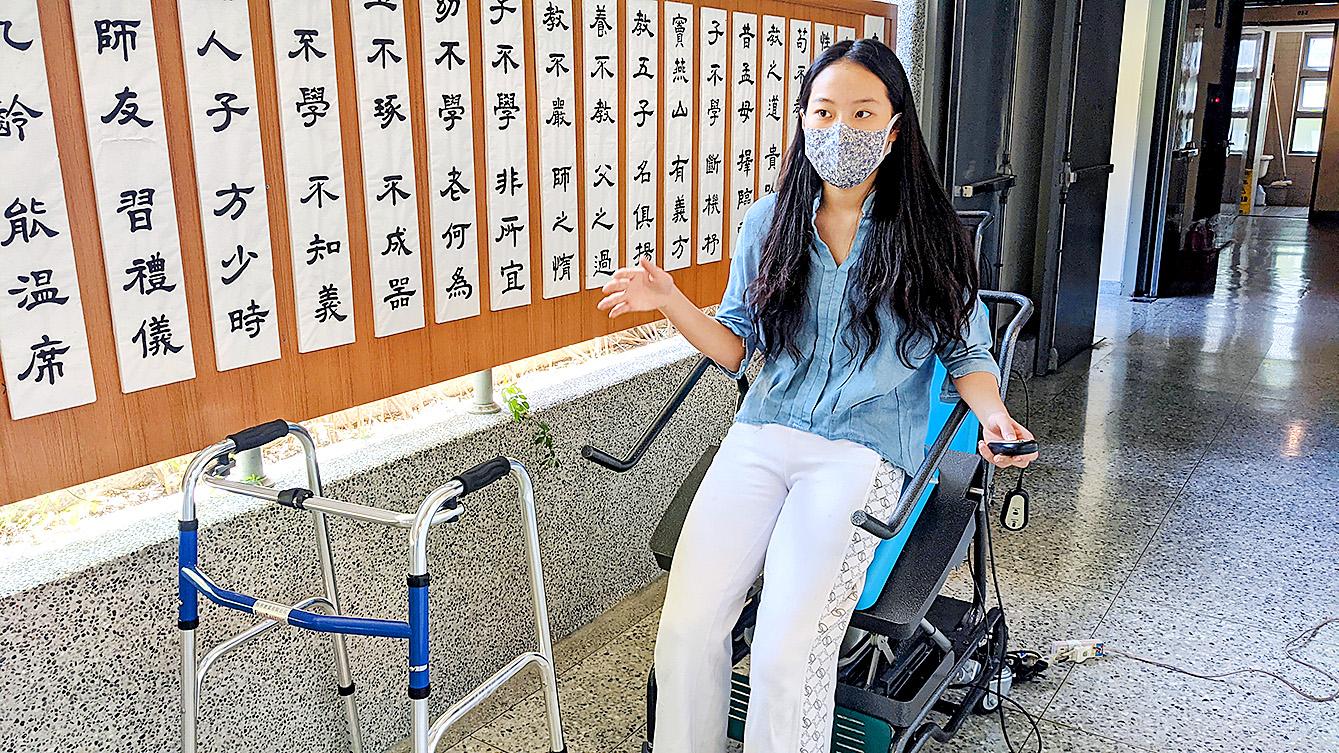In less than a year, 10th-grader Isabella Peng (彭少函) went from not knowing how to use a screwdriver to claiming a gold medal at the Moscow International Salon of Inventions and Innovative Technologies.
Peng and her team of junior and senior high school students took top honors for their invention, a wheelchair that mechanically rises so that users can use regular toilets. The competition was held virtually last month.
Taiwanese innovations made up 48 of the over 600 entries from 18 countries, and the nation finished with 35 golds and the second most medals overall.

Photo: Han Cheung, Taipei Times
Team adviser Chang Hung-hsun (張閎勛), who teaches at Taipei Fuhsing Private School, says there’s still a bit of work to do on the machine; it’s currently cobbled together with spare parts and basic circuitry. Coupled with the costs for mass production and marketing, it’s generally hard for teams to monetize their inventions.
A biodegradable face mask sounds like a great idea, for instance, and while a prototype can win awards, the team from National Yunlin University of Science and Technology says it’s too expensive to mass produce.
However, Chang says it’s the process that counts. The competitions push the students to create working prototypes of their ideas from start to finish, and also offer the opportunity to travel and present their work in front of a foreign audience.

Photo: Han Cheung, Taipei Times
“They just need a chance to pick up the tools and build some stuff,” Chang says. “I hope this sparks a fire in them and helps them figure out their future path.”
Wu Chih-yao (吳智堯), director of the Chinese Innovation and Invention Society (中華創新發明學會), the organization that leads the Taiwanese delegation, says the medals get the attention, but their goal is to promote creative education in schools and nurture future inventors.
“People need a concrete goal to aspire to,” Wu says. “The competition gives these students a deadline to finish their prototype, and a chance to learn what other people are doing.”

Photo: Han Cheung, Taipei Times
INVENTION NATION
Taiwanese love to invent, Wu says, a practice that has been encouraged and supported by the government in the past. The nation consistently ranks among the top 10 in the world in patents per the US Patent and Trademark Office, finishing sixth in the world last year.
Wu says that even though not all products can be commercialized, intellectual property is a valuable asset. Taiwan can export its creativity, and he says the association hopes to foster it from an early age.
“Even if they don’t go into the field, I hope that when they’re working in a company in the future, they’re able to look at something and think, ‘How can this can be changed?’” Wu says.
The majority of competition participants are students, although a tech company may want to enter their market-ready creations to add “award-winning” value to it. Japanese competitions are more popular for professional entrants, Wu says, as they find them more prestigious for promotion.
“It’s harder to tell what happens with the student inventions, which are often in the early stages of development,” Wu says.
Peng says she might make a wheelchair for her grandmother, who has difficulty moving around.
“Maybe three or five years later, she’ll specialize in such products,” Wu says.
PROCESS MATTERS
Chang has been guiding invention competition teams at school for about a decade. It started when one student asked him for help on a bicycle powered generator. They built a prototype and the student ended up winning an Italian award and traveled to Italy to present his work.
“That kind of experience, for a student, can be life changing,” Chang says.
Chang’s small office at the school is packed with all manner of parts and prototypes, fully looking the part of a tinkerer’s laboratory. He says his objective as an inventor is to make existing objects more affordable and improve their function, such as modified massage rollers and a modified emergency triangle for road safety.
Peng, a Fuhsing alumnus, knew of Chang’s program and contacted him when she returned to Taiwan last year to study virtually due to COVID-19.
She was especially interested in the wheelchair due to her grandmother’s condition, as well as her brother undergoing surgery last year. Her brother later joined the team, and they spent their weekends working with Chang, learning how to use tools or visiting factories to order parts.
One of the finished contraptions has a built-in portable toilet, whose seat raises the user up at a comfortable angle with minimum stress on the knees.
Peng says she probably won’t become an inventor in the future, but the experience has encouraged her to actively solve problems in everyday life.
One only needs a junior high school-level of science education to understand the principles behind the machine, but Chang says the students often don’t get to put this knowledge to practical use. Before tinkering, they analyze existing products, analyze their flaws and brainstorm how to realistically make it better.
Not all of Chang’s projects make it to the competition stage. They worked on a three-dimensional face mask prototype, but abandoned the project after realizing that people still prefer the look of traditional face masks.
“That teaches the students how to make decisions, when to let go and quickly identify an alternate path,” he says. “What I want to give them is this experience. We’ve run into all sorts of problems, including the [previous version of the wheelchair] being too heavy to bring onto the plane. This is all valuable experience.”

Cheng Ching-hsiang (鄭青祥) turned a small triangle of concrete jammed between two old shops into a cool little bar called 9dimension. In front of the shop, a steampunk-like structure was welded by himself to serve as a booth where he prepares cocktails. “Yancheng used to be just old people,” he says, “but now young people are coming and creating the New Yancheng.” Around the corner, Yu Hsiu-jao (饒毓琇), opened Tiny Cafe. True to its name, it is the size of a cupboard and serves cold-brewed coffee. “Small shops are so special and have personality,” she says, “people come to Yancheng to find such treasures.” She

Late last month Philippines Foreign Affairs Secretary Theresa Lazaro told the Philippine Senate that the nation has sufficient funds to evacuate the nearly 170,000 Filipino residents in Taiwan, 84 percent of whom are migrant workers, in the event of war. Agencies have been exploring evacuation scenarios since early this year, she said. She also observed that since the Philippines has only limited ships, the government is consulting security agencies for alternatives. Filipinos are a distant third in overall migrant worker population. Indonesia has over 248,000 workers, followed by roughly 240,000 Vietnamese. It should be noted that there are another 170,000

In July of 1995, a group of local DJs began posting an event flyer around Taipei. It was cheaply photocopied and nearly all in English, with a hand-drawn map on the back and, on the front, a big red hand print alongside one prominent line of text, “Finally… THE PARTY.” The map led to a remote floodplain in Taipei County (now New Taipei City) just across the Tamsui River from Taipei. The organizers got permission from no one. They just drove up in a blue Taiwanese pickup truck, set up a generator, two speakers, two turntables and a mixer. They

Hannah Liao (廖宸萱) recalls the harassment she experienced on dating apps, an experience that left her frightened and disgusted. “I’ve tried some voice-based dating apps,” the 30-year-old says. “Right away, some guys would say things like, ‘Wanna talk dirty?’ or ‘Wanna suck my d**k?’” she says. Liao’s story is not unique. Ministry of Health and Welfare statistics show a more than 50 percent rise in sexual assault cases related to online encounters over the past five years. In 2023 alone, women comprised 7,698 of the 9,413 reported victims. Faced with a dating landscape that can feel more predatory than promising, many in